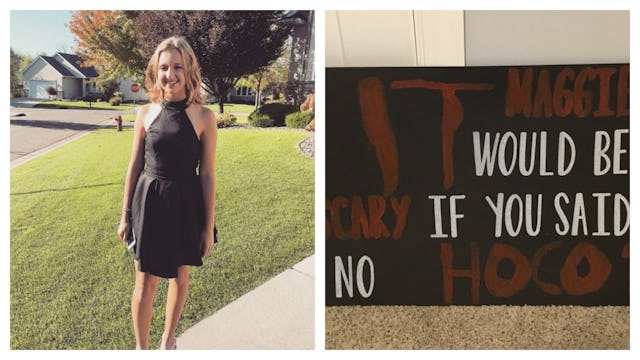Since When Did Homecoming Dances Become Such A Big Deal?

Back in my day, being asked to a homecoming dance was thrilling in and of itself. There was no pomp and circumstance, no grand gestures. It generally amounted to a boy nervously picking up the phone (yes, I’m so old we actually used to talk to each other on phones) and stammering, “Will you go with me?” at the person on the other line.
The end.
My daughter, officially a high-schooler this year, told me matter-of-factly that she would be attending her first ever school dance with a friend we know and approve. “Oh, that’s great honey,” I remarked. “When did he ask you?”
“Well, he told me he is asking me, but he hasn’t, like, ‘asked me’ asked me yet because it’s not all planned out yet,” she explained, while my brow furrowed in yet another dead giveaway of my uncoolness.
“Mom, you don’t just ask someone. It’s a whole production now,” she said impatiently while my mouth opened and closed like an oversized goldfish. Say what, now?
Kids today are coming up with all sorts of ways to outdo each other vying for the attention of potential homecoming dates. Spelling out “HC” in rose petals, creating elaborate scavenger hunts, slapping “Wanted” posters all over school hallways, or decorating their rooms with flowers and balloons. What’s next, a carrier-pigeon? And all the while they use social media to capture it and hopefully garner a “yes” (and hundreds of likes) in the process.
While kids today do get points for creativity, there are some very real drawbacks to this very public tradition.
For one, most of these “productions” require money, oftentimes lots of it. For kids (usually boys) who don’t have the means to keep up, it can leave them feeling inadequate and embarrassed. It can also require parents or friends to help construct these elaborate campaigns, leaving those who don’t participate feeling either guilty or more isolated.
Pressure also prods kids, usually boys, to ask their dates in fashion similar to their peers. Those with an aversion to attention may be deterred from attending a dance altogether, something that more than one of my boy-mom friends said their son would be doing. Throw in social media which makes these grand gestures instantly visible for all to see, and it’s just another way to ostracize kids who don’t get asked or aren’t comfortable doing the asking.
We are also sending a message to those on the receiving end, in most cases young girls, that they can’t say no. My daughter and many of her friends are of the opinion that if a boy goes to this amount of effort to ask them, regardless of how they feel about their suitor, they would never, ever say no. It doesn’t matter how disappointed a girl is or who she actually wanted to go with, she will be deemed the rude or bitchy one for declining.
Aren’t we teaching our girls from a very early age that, no matter how uncomfortable they are or whether they want to go or not, their feelings matter less than someone who exerted so much effort on their behalf. That she is somehow indebted to him and owes him that date he worked so hard to get.
It seems like a lot of unnecessary stress on both sides of the equation. You aren’t asking for that person’s hand in marriage here; you are attending a school dance together. Can we just leave it at a phone call and save the big, sweeping gestures for when it really matters?